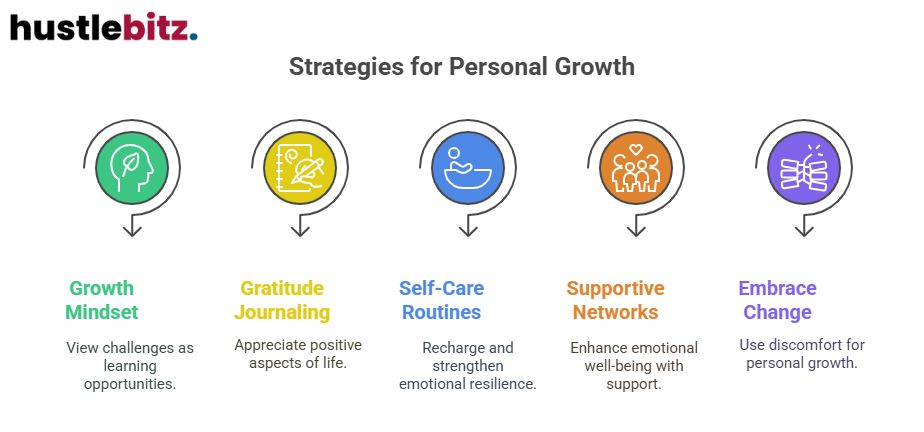Harnessing positivity is crucial for navigating life’s uncertainties. A positive mindset enhances emotional resilience and encourages proactive behavior in the face of adversity. By shifting your perspective through cognitive reframing and gratitude, you can transform negative thoughts into empowering narratives. Engaging in self-care and creative hobbies fosters joy and well-being, while strong social connections provide critical support. Embracing change, recognizing the beauty in small moments, and cultivating a growth mindset contribute to personal growth. These strategies not only promote resilience but also empower you to face challenges with confidence. Explore further to uncover additional insights and techniques.
Key Takeaways
- Cultivate a growth mindset to view challenges as opportunities for learning and personal development.
- Practice gratitude journaling to shift focus from negativity to appreciation of the positive aspects of life.
- Engage in self-care routines to recharge and strengthen emotional resilience amidst uncertainties.
- Surround yourself with uplifting content and supportive networks to enhance emotional well-being.
- Embrace change and discomfort as catalysts for personal growth and creative exploration.

Understanding Positivity’s Power
Understanding the power of positivity is essential for navigating life’s challenges, as it not only enhances emotional resilience but also fosters a proactive approach to adversity. The principles of positive psychology highlight the significance of cultivating a positive mindset, which can lead to improved well-being and a greater capacity to handle stressors effectively. By focusing on strengths and possibilities, individuals can create a foundation for personal growth and fulfillment.
Emotional intelligence plays a critical role in this process, as it involves recognizing and managing one’s own emotions while also empathizing with others. This heightened awareness allows for better responses to challenging situations, facilitating cognitive reframing—an essential technique in which negative thoughts are transformed into constructive perspectives. Through cognitive reframing, individuals can shift their understanding of events, allowing them to perceive obstacles as opportunities for learning and development.
Additionally, self-affirmation techniques serve as powerful tools for reinforcing positive beliefs and values. Engaging in self-affirmation can bolster confidence and mitigate feelings of self-doubt, ultimately contributing to a resilient mindset.
Shifting Your Mindset

To effectively shift your mindset, it is crucial to adopt strategies that promote positive thinking and reframe negative experiences into opportunities for growth. Mindset shifts are essential for navigating life’s uncertainties, as they enable perspective changes that foster resilience and adaptability.
By engaging in cognitive reframing, individuals can transform limiting beliefs into empowering narratives, allowing for emotional regulation in challenging situations.
Here are three strategies to facilitate this shift:
- Practice Self-Reflection: Regularly assess your thoughts and beliefs. Identifying negative patterns can help you understand how they influence your emotions and behaviors, paving the way for belief transformation.
- Cultivate a Growth Mindset: Embrace challenges as opportunities to learn rather than obstacles. This perspective change encourages resilience and fosters a sense of agency, reinforcing the idea that effort and perseverance lead to improvement.
- Surround Yourself with Positivity: Engage with uplifting content and positive influences, whether through literature, podcasts, or supportive social circles. This practice can enhance emotional regulation by providing a steady stream of encouragement and inspiration.
Incorporating these strategies into your daily life will not only facilitate mindset shifts but also empower you to navigate uncertainties with a more positive and proactive approach.
The Role of Gratitude

Gratitude serves as a powerful catalyst for cultivating a positive mindset, enabling individuals to shift their focus from what is lacking to appreciating the abundance in their lives. This shift in perspective is essential for navigating the uncertainties of life, as it fosters resilience and emotional well-being.
One effective method to nurture gratitude is through gratitude journaling, where individuals regularly record moments of appreciation. This practice not only encourages thankful reflections but also allows for a structured approach to recognizing positive experiences.
Incorporating gratitude rituals into daily life can further enhance this mindset. These rituals may include simple acts such as expressing appreciation to others, whether through verbal affirmations or written notes. Such expressions not only uplift the giver but also strengthen interpersonal connections, creating a supportive network during challenging times.
Additionally, utilizing positive affirmations that center around gratitude can reinforce this mindset. By affirming one’s appreciation for both the small and significant aspects of life, individuals can cultivate a deeper sense of fulfillment. This approach encourages a proactive stance toward life’s challenges, allowing for a more balanced emotional state.
Ultimately, the role of gratitude in our lives cannot be overstated. By engaging in gratitude journaling, embracing thankful reflections, and implementing gratitude rituals and positive affirmations, individuals can foster a robust sense of positivity, supporting them in navigating the uncertainties that life presents.
Through these practices, gratitude emerges as a transformative tool for enhancing overall well-being.
Cultivating Resilience
Building on the foundation of gratitude, cultivating resilience involves developing strategies that empower individuals to effectively cope with challenges and bounce back from adversity. This process not only enhances emotional strength but also fosters personal growth, as individuals learn to navigate life’s uncertainties with confidence.
By nurturing resilience, people can better manage stress and approach obstacles with a constructive mindset.
To cultivate resilience, consider the following strategies:
- Practice Adaptive Thinking: Embrace a flexible mindset that allows for re-evaluation of situations. This involves recognizing negative thought patterns and replacing them with more positive, constructive alternatives that promote problem-solving.
- Develop Strong Support Networks: Surrounding oneself with supportive friends, family, or community members provides a safety net during difficult times. These connections can offer encouragement, perspective, and advice, ultimately aiding in overcoming obstacles.
- Engage in Self-Care: Prioritize activities that enhance well-being, such as regular exercise, mindfulness practices, and adequate rest. Effective stress management techniques are crucial in maintaining emotional strength and preventing burnout.
Embracing Change

Embracing change is essential for personal growth, as it allows individuals to adapt to new circumstances and seize opportunities that arise from life’s inevitable transitions. Change often brings discomfort; however, by embracing discomfort, individuals can develop resilience and a more profound understanding of themselves. This process of navigating transitions is crucial, as each shift in life—whether minor or significant—presents a chance for transformation.
Accepting impermanence is a vital aspect of this journey. Life is inherently transient, and recognizing this truth can empower individuals to let go of what no longer serves them. By fostering adaptability, one becomes better equipped to face unforeseen challenges, ultimately leading to a more enriched life experience. This adaptability is not merely about reacting to change, but rather proactively engaging with it, allowing for personal development in the face of uncertainty.
Moreover, welcoming uncertainty can be liberating. Instead of fearing the unknown, individuals can learn to view it as a canvas for creativity and exploration. Embracing change involves a conscious shift in mindset, where uncertainty is perceived not as a threat, but as an opportunity for growth and discovery.
Finding Joy in Small Things

Recognizing and appreciating the small moments in daily life can significantly enhance overall well-being and foster a more positive mindset. Engaging with simple pleasures can transform mundane routines into joyful experiences. By cultivating mindfulness practices, individuals can learn to be present, savoring each moment rather than rushing through life.
To effectively find joy in small things, consider these three strategies:
- Nature Appreciation: Spend time outdoors, whether it’s a leisurely walk in the park or simply sitting in your garden. Observing the beauty of nature—like the intricate patterns of leaves or the sound of rustling trees—can evoke a profound sense of peace and joy.
- Creative Hobbies: Engage in activities that ignite your creativity, such as painting, writing, or crafting. These pursuits not only provide an outlet for self-expression but also encourage a state of flow, allowing you to immerse yourself fully in the present.
- Social Connections: Foster relationships with family and friends. Sharing laughter, stories, or even a cup of coffee can create moments of joy that enhance emotional well-being. Building and maintaining these connections is essential for a fulfilling life.
Incorporating these practices into daily routines enables individuals to cultivate a mindset that appreciates life’s small wonders, reinforcing resilience in the face of uncertainty. Embracing these joyful experiences can lead to a more enriched and positive life.
Incorporate Positivity in Daily Life

Incorporating positivity into daily life can be achieved through intentional practices that enhance one’s outlook and foster resilience amidst challenges. One effective method is engaging in mindful practices, which encourage individuals to remain present and fully experience each moment. This heightened awareness can lead to reduced stress and improved emotional well-being.
Another powerful tool is the use of positive affirmations. By regularly affirming one’s strengths and capabilities, individuals can cultivate a more optimistic self-image, thereby reinforcing their ability to navigate life’s uncertainties. It is essential to integrate these affirmations into daily routines, allowing them to reshape thought patterns over time.
Building and maintaining supportive relationships is also crucial for fostering positivity. Surrounding oneself with individuals who uplift and encourage growth can create a nurturing environment that reinforces resilience. Engaging in joyful activities, whether through hobbies or social events, further enhances this sense of community and connection, providing a foundation of happiness amidst challenges.
Moreover, establishing self-care routines is vital for sustaining a positive mindset. Prioritizing personal well-being through activities such as exercise, meditation, or creative pursuits enables individuals to recharge and maintain their emotional health. By committing to these practices, individuals not only enhance their outlook but also equip themselves with the tools necessary to face life’s uncertainties with grace and confidence.
Ultimately, incorporating positivity into daily life is a deliberate process that yields significant rewards in terms of both mental and emotional resilience.
Final Thoughts
Navigating life’s uncertainties becomes more manageable when we harness the power of positivity. By adopting a growth mindset, practicing gratitude, and engaging in self-care, we strengthen our emotional resilience and develop the tools needed to face challenges with confidence. Incorporating mindful practices, nurturing supportive relationships, and finding joy in the small moments create a balanced approach to managing stress and embracing change. Ultimately, by cultivating positivity in our daily lives, we empower ourselves to approach life’s unpredictability with optimism and purpose, leading to greater personal growth and fulfillment.




